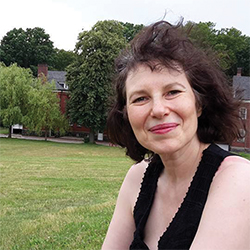Anal Cancer Survivor
Persistence Paid Off, Delivering Successful Results
 As devastated as she was to receive an anal cancer diagnosis, Liora Brosh didn’t have a knee-jerk reaction when it came to choosing a treatment plan. She researched the options that could coincide with her lifestyle, and she trusted her gut. Today, she is NED (no evidence of disease) and feels great. She wants others to know there is hope after hearing “You have cancer.”
As devastated as she was to receive an anal cancer diagnosis, Liora Brosh didn’t have a knee-jerk reaction when it came to choosing a treatment plan. She researched the options that could coincide with her lifestyle, and she trusted her gut. Today, she is NED (no evidence of disease) and feels great. She wants others to know there is hope after hearing “You have cancer.”
Anal cancer is rare and difficult to diagnose. It took two years, many medical appointments and quite a few tears before I learned I had it. Because I was 58, menopause got the blame for many of my symptoms: pelvic pressure that felt like a constant urinary tract infection, and a general sense of fatigue. Rectal bleeding was attributed to hemorrhoids. I followed many instructions, performing Kegel exercises and no longer doing squats while I exercised so as not to irritate the “hemorrhoids.” Even a colonoscopy did not find the carcinoma.
As time went on, I grew more concerned that something was seriously wrong. Finally, in October 2018, a very frank conversation with a friend about her husband’s hemorrhoids convinced me that my symptoms were nothing like his. I went to a new gastrointestinal specialist who performed a digital exam. I had a mass that was bleeding. He ordered a colonoscopy and biopsy.
I am a college professor and teach at two universities in a large metropolitan area. I was on campus heading to one of my classrooms when I got the call telling me I had a carcinoma. I texted my brother who lives abroad: “I have cancer.” Then I went in and taught.
I am fortunate that my city has many hospitals. I saw an oncologist the very next day. He told me the cancer was caused by the human papillomavirus (HPV). That surprised me because I’d never had it show up on any Pap smear results. He was rather insensitive, and we even argued. I felt like he was telling me I had an STD and that it was my fault I had cancer. His suggested treatment plan was chemotherapy with a port and a pump. I didn’t love that idea because I’m single and not working wasn’t an option. My classes are in different parts of the city, and I take public transportation. I was concerned it would be difficult to manage all of it because I have no family in the U.S., but he really didn’t entertain any other options. The entire visit was upsetting, and I left knowing I had to find the right doctor.
At the next hospital, the oncologist read directly from a PowerPoint presentation. I asked and learned he’d never treated anal cancer. The search for better medical care continued.
I received a referral from a friend for an oncologist at a third hospital who had more experience treating anal cancer, something I wanted not only for treatment but also for the prevention and management of long-term side effects. I watched a video from an anal cancer survivor. She talked about oral chemotherapy. That was exactly what I wanted! When I met with the doctor, I was prepared to talk about the type of treatment I hoped for and why. During the conversation, I was thrilled to discover I’d finally found a good fit.
My treatment plan consisted of chemotherapy in pill form and radiation therapy. The first four weeks were okay. I was able to continue working and exercising, though I had nausea in the evenings. I feared I might throw up on the subway but then thought, “Hey, that won’t matter, happens all the time here.”
Before long, the radiation caused the skin to break down; I had vaginal lesions and extremely painful blisters. I was very fatigued. It was a struggle to walk the four blocks to the subway station, and I couldn’t stand longer than 30 minutes while I taught. My radiation oncologist stopped the chemotherapy pills two days early because he was concerned the radiation wounds would become infected. Fortunately, the treatment was successful. I’ve been NED (no evidence of disease) since December 2018.
A good support system is so important. It’s hard being single and having cancer. I’ve lived in the city for more than 25 years and have often worried what I’d do if I sprained my ankle or got the flu. Never once did I worry about having cancer. My brother flew in from abroad early on in my treatment and stayed for a month. When he left, my cousin who was working in Cambodia came for a week. I also had a really good friend who helped a lot.
Being treated for any type of cancer is difficult, but anal cancer comes with a particular set of emotions. You’re being treated in a very private area in what feels like a very public way. Everyone is looking at your behind! I found that talking with other survivors through the anal cancer advocacy groups to be enormously helpful.
I can’t stress enough how important it is to be your own advocate. I really wanted oral chemotherapy, which is not used in some cancer centers in the U.S. You won’t get what you want if you don’t ask. Stick to your guns. Even though it may feel like it, many times cancer is not an emergency. It’s worth it to take a little time to find the best medical team for you.


